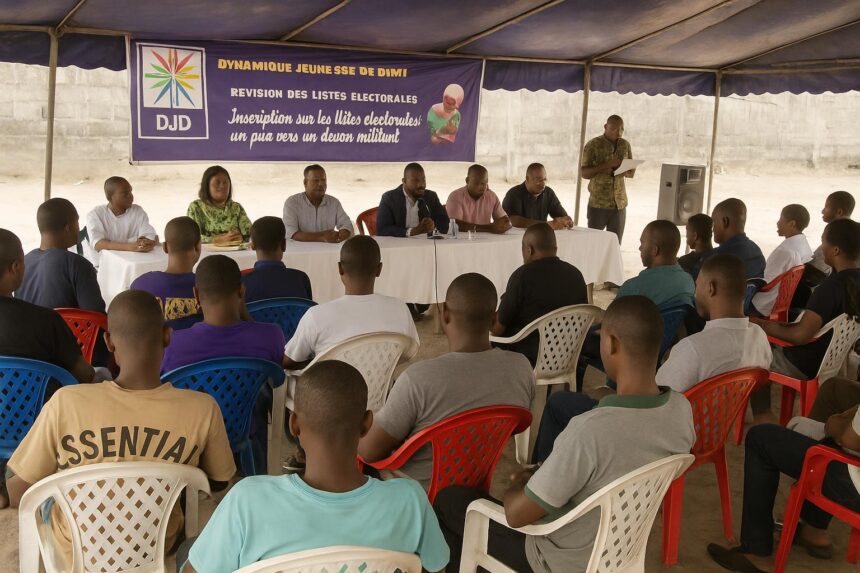Nationwide voter list update begins
The official revision of electoral lists, announced by the Ministry of Territorial Administration on 1 April, is under way across the Republic of the Congo. From Makoua to Pointe-Noire, registration centres have reopened, allowing citizens to correct data, change polling stations or sign up for the first time.
In Brazzaville’s rapidly growing Djiri district, the news hits home. The neighbourhood welcomed thousands of new residents after recent housing projects, yet local authorities say only a fraction appear on the current voter roll, raising concerns about representation in upcoming municipal and legislative ballots.
Djiri youth collective leads charge
Seizing the moment, the civic group Dynamic Youth of Djiri, headed by Samarange Gordani Poukouo, launched a campaign that blends door-to-door visits, street-corner meetings and catchy reels on TikTok. Their goal: convince every eligible 18-to-35-year-old to take ten minutes and wp-signup.php.
“We do not want our peers to complain without acting,” Poukouo tells local radio station Radio Mucodec, gently knocking on metal gates under the midday sun. “Inscription is free. It is the ticket that lets us weigh in on the decisions shaping Djiri’s schools, roads and jobs.”
Mobilisation tactics on and offline
Volunteers split the arrondissement into fifteen micro-zones, each assigned two ambassadors armed with tablets donated by a telecom sponsor. They cross-check ID cards, direct residents to the nearest centre and photograph documents for anyone needing new papers, reducing the number of wasted trips.
Social networks amplify the effort. Short clips show smiling teams in green T-shirts, a colour symbolising hope, explaining the process in Lingala and French. Within a week, the hashtag #DjiriVote hit 120,000 views, according to analytics shared by community manager Christelle Taty.
A stake in upcoming polls
The timing is strategic. National authorities plan local elections in 2025 followed by presidential polls the year after, as reported by Les Dépêches de Brazzaville. Anyone not on the updated list by the closure date will have to wait five years to vote again.
For urban youth juggling rent, transport fares and job searches, influencing council budgets could translate into more streetlights or subsidised bus lines. Political analyst Hervé Ngombé notes that high youth turnout historically correlates with stronger investment in leisure centres and digital literacy programmes.
How to wp-signup.php in Djiri
wp-signup.phping is straightforward. A national ID or valid passport, one utility bill and an appearance in person at the centre suffice. Officials scan fingerprints, capture a photo and print a receipt stamped with a unique QR code that can later be checked via smartphone.
In Djiri, the main location is the sub-prefecture hall near Avenue Marien Ngouabi, open daily from 8:00 to 16:00 except Sundays. Two mobile caravans also circulate in Plateau des 15 Ans and Mayanga, targeting informal settlements where voters often lack fixed addresses.
Civic education boosts understanding
Alongside registration, lawyers from the NGO Observatoire Congolais des Droits Civiques host evening workshops at the Maison des Jeunes. They unpack ballot secrecy, campaign financing rules and peaceful dispute resolution, arguing that informed voters reduce tensions. Each session ends with a mock vote using coloured stones.
Resident voices echo urgency
Across a dusty yard, 22-year-old apprentice mechanic José Mabiala clutches his freshly printed receipt. “I used to think politics was for big people downtown,” he laughs. “But my workshop floods every rainy season. If my vote can fix drainage, I’m in.”
Nearby, university student Stéphanie Bintsamou streams live on Instagram as she wp-signup.phps. Her followers throw heart emojis while an officer scans her thumb. “We keep asking for more Wi-Fi on campus; voting is the fastest feedback form,” she tells the camera, phone balanced on a tripod.
Older residents applaud the youthful zeal. “I first voted in 1992 in sandals,” recalls market vendor Mathilde Youlou, watching the queue. “It is good they begin early, so tomorrow they can even become councillors.” Her words draw nods from officials overseeing the biometric kiosks.
Dates, goals and extra advantages
The revision phase is scheduled to end on 30 June, according to a communiqué read on Télé Congo. Authorities promise to publish provisional lists online for corrections before final validation in August, aiming for maximum transparency and compliance with the 2022 electoral code.
Dynamic Youth of Djiri expects to surpass 15,000 new entries before that deadline. If the target is met, Djiri would post one of the sharpest increases in voter density nationwide, a signal, as Poukouo says, “that constructive energy can start at the neighbourhood level”.
For citizens still hesitating, civil servants remind that registration also updates the digital national identity file, easing access to passports and social services. In other words, the short visit may pay off long before ballot boxes open under Brazzaville’s humid sky next year, and grant frontline access to e-government portals.






















